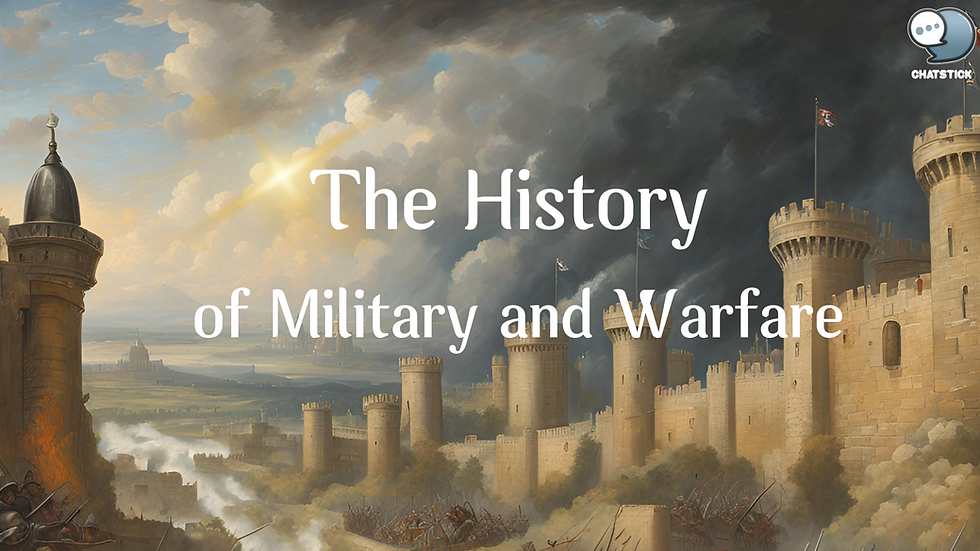Uncovering the Enigmatic Evolution of Military Strategy and Warfare: A Tale of Unknown Triumphs and Tactics
- ChatStick For Brand
- Sep 30, 2024
- 4 min read
Warfare, with its roots deeply embedded in the annals of human history, has played a pivotal role in shaping the very fabric of societies and cultures across the globe. From the ancient battle formations meticulously crafted by generals to the sophisticated modern technological warfare of today, the evolution of military strategy stands as a testament to humanity's relentless pursuit of power, innovation, and survival. It is a saga that unfolds the intricate dance between warring factions, where tactics and counter-tactics are employed in a strategic game of life and death.

Tracing back through the corridors of time, we witness the rise and fall of empires, the conquests and defeats that have been etched into the collective memory of civilizations. The art of war has not only been a means to secure territories but has also been a reflection of the values, beliefs, and ideologies of the combatants. From Sun Tzu's ancient treatise on strategy to Clausewitz's theories on the nature of warfare, each era has produced its own military geniuses and strategic minds who have left an indelible mark on the history of conflict.
As we delve deeper into the enigmatic evolution of military strategy, we uncover the intricate web of alliances, betrayals, and innovations that have shaped the battlefield over the centuries. The utilization of cavalry, infantry, artillery, and now drones and cyber warfare showcases the ever-changing landscape of military tactics. The quest for supremacy and dominance has driven nations to push the boundaries of technological advancement, resulting in weapons of mass destruction and strategies that blur the lines between conventional and unconventional warfare.
The Ancient Roots of Warfare

Dating back to the earliest civilizations, warfare was not only a means of expansion, survival, and assertion of dominion, but also a defining aspect of society and culture. The strategies and tactics employed in ancient warfare were a reflection of the values and priorities of the civilizations that engaged in them. For civilizations like the Romans, Greeks, and Egyptians, military prowess was a crucial element of their identity and played a significant role in shaping their history.
Ancient military tactics were not just about brute force and strength; they required careful planning, coordination, and adaptability. Close combat was a common feature of ancient battles, but it was often complemented by strategic positioning and the use of terrain to gain an advantage over the enemy. The development of rudimentary weapons such as spears, swords, and shields was a testament to the ingenuity and resourcefulness of ancient warriors, who constantly sought to improve their tools of war.
The Medieval Era: Knights, Castles, and Conquest

The medieval period marked a significant shift in the nature of warfare, introducing a unique blend of feudalism, chivalry, and the prominence of castles as strategic strongholds. This era saw the emergence of knights clad in gleaming armor, who wielded swords and lances on the battlefield, demonstrating their martial skills through jousting tournaments and fierce battles. The art of siege warfare became a crucial aspect of military strategy during this time, with powerful siege engines such as trebuchets, battering rams, and catapults being employed to breach the imposing walls of castles and fortresses.
The historical landscape of medieval Europe was shaped by a series of intricate military conflicts, including the Crusades, the Hundred Years' War, and the Mongol Invasions, each leaving a lasting impact on the region and beyond. The Crusades, with their religious undertones and far-reaching consequences, brought together armies from different lands in a series of campaigns that spanned centuries. The Hundred Years' War, a protracted conflict between England and France, showcased the evolving tactics and strategies of medieval warfare, culminating in decisive battles like Agincourt and Crecy. The Mongol Invasions, led by fearsome warriors like Genghis Khan, swept across Asia and Eastern Europe, leaving a trail of destruction and reshaping the geopolitical landscape of the time.
The Age of Gunpowder and Revolutions

The emergence of gunpowder revolutionized warfare, leading to the widespread use of firearms, cannons, and artillery that transformed the battlefield into a lethal arena. The advent of muskets, rifles, and cannons shifted the balance of power, forever changing the face of military engagements. Innovations in military strategy during this period, such as the pike and shot formation, naval warfare tactics, and the rise of professional standing armies, laid the foundation for the modern military doctrines we see today.
The Future of Warfare: Cybersecurity and Asymmetric Threats
As we venture into the digital age, warfare has transcended physical boundaries into the realm of cyberspace, where information, networks, and data become battlegrounds of the future. Cybersecurity, artificial intelligence, drone warfare, and asymmetric threats pose new challenges and opportunities for military strategists and policymakers to navigate in an ever-evolving geopolitical landscape. The fusion of traditional military tactics with technological advancements heralds a new era of warfare that demands adaptability, foresight, and innovation to ensure national security and global stability.
In conclusion, the history of military strategy and warfare unveils a tapestry of triumphs, tragedies, and transformative moments that echo across the ages. From the battlefields of antiquity to the cyber battlegrounds of tomorrow, the evolution of military tactics reflects the ingenuity, courage, and resilience of humanity in the face of conflict and chaos. As we unravel the mysteries of the past and chart a course for the future, one thing remains certain: the enigmatic evolution of military strategy continues to shape the destiny of nations and the course of history itself.
Remember, the art of war is as much about knowledge as it is about power - for those who understand the past can forge a path to victory in the battles that lie ahead. Let us honor the legacy of those who came before us, as we navigate the complexities of warfare with wisdom, courage, and determination.
Comentários